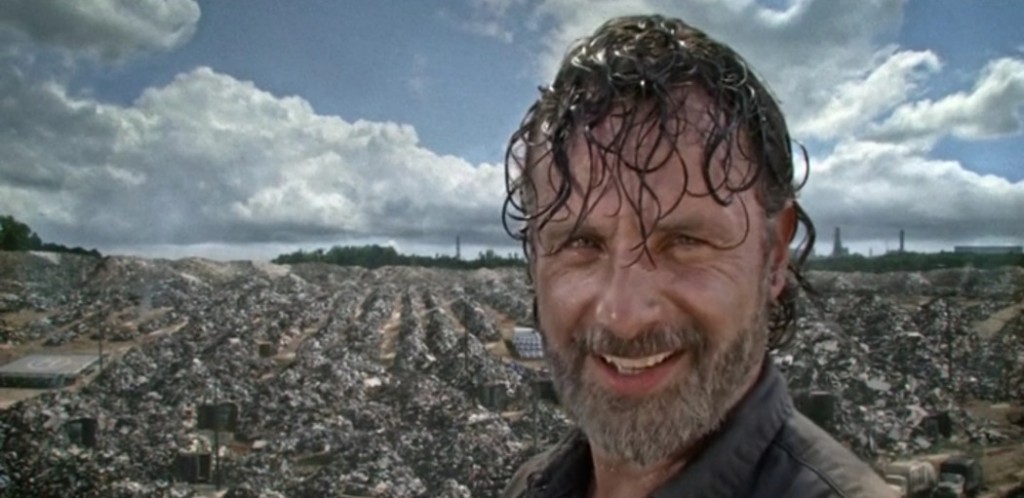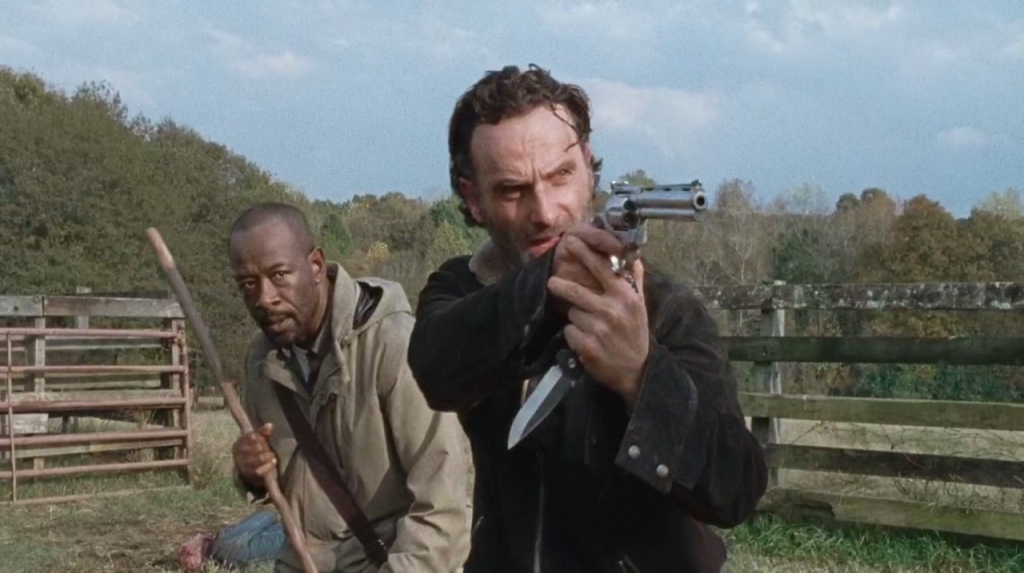-
Recent Posts
- Better Call Saul: There Are No Happy Endings between a “Rock and Hard Place”
- Black Widow Keeps It in the Family for Natasha’s Last Ride
- Loki Finds New Purpose in the Man behind the Mischief
- In its Debut, Star Wars: The Bad Batch Decides Whether to Obey or Rebel
- Nomadland: A Film Out of Time, For Our Times
Archives
Recent Comments
Meta
Tag Archives: Daryl Dixon
The Walking Dead Tries to Rebuild the World with “A New Beginning”
I spent so much of The Walking Dead’s last major arc wondering “why don’t our heroes just take out Gregory?” Sure, so much of that arc was, yet again, about the battle for the soul of their community, a theme illustrated through choices about whether to spare people in order to remain good Samaritans or to hurt and harm and kill them like The Saviors, because that’s what it takes to beat The Saviors. Not executing Gregory, not sending him out to fend for himself, was meant not just as a sign of mercy, but as a sign that the good guys were morally better than the bad guys.
But good lord, surely at some point after he’s tried to sell you out to those same bad guys, after he’s tried to sow chaos and mistrust for you and your group, after he’s proven to be nothing but a unredeemable heel through and through, you rid yourself of the guy one way or another. Beyond a certain point, practicality has to win out, and someone who practically goes out of his way to cause trouble and threaten your life and the lives of the people you care about has to go.
The Walking Dead Shows Negan as a True Believer and a Leviathan in “The Big Scary U”
“A war of all against all.” That’s how philosopher Thomas Hobbes pithily explained the “state of nature,” his theoretical account of what it was like when human beings lived without government, without order, and without rule. He imagined a life that was “nasty, brutish, and short” and posited that we all needed a Leviathan, the personification of the force and power of the government, to avoid that unenviable existence. On Hobbes’ account, people needed to give up certain freedoms and turn things over to the Leviathan to ensure compliance with the order of the day, as the price to avoid that endless, indiscriminate war.
In Negan’s mind, he is that Leviathan. The last time The Walking Dead interrogated Negan’s moral philosophy, it left it ambiguous how the leader of The Saviors viewed himself. It was nebulous whether Negan really believed that his brutal ways were for the greater good, or whether he was just spinning propaganda to justify the comparatively lavish and carefree lifestyle he could enjoy while others toiled.
“The Big Scary U” is much less ambiguous. There is a certain sense that Negan may be deluding himself, offering rationalizations and eliding the darker or more self-serving side of the choices he’s made. But it nevertheless becomes clear that, on the surface at least, he is a true believer, someone who thinks that he’s doing what needs to be done to avoid a worse fate for everyone.
The Walking Dead: Finding Fault and Absolution on “The Other Side”

Fault is a slippery concept. It’s bundled up with intentions, results, and a host of other complicating factors, all of which affect whom we blame and whom we absolve when things go badly. Some people wrong us without meaning to. Others intend to hurt us but inadvertently give us exactly what we need. And some people simply twist in the wind, unsure or unaware of the damage they do to others. How we credit and blame people for their actions and inaction says as much about who we are as it does about the person we’re judging.
But how we move past those assessments of fault, whether we’re blaming others or blaming ourselves, can be just as telling. It matters how we try to overcome, or avoid, the bad blood, hurt feelings, and guilt. In “The Other Side,” Daryl blames himself, Gregory bends over backwards to avoid any perception of fault, and Sasha and Rosita hash out their awkward, shared part in Abraham’s life and death, each trying to figure out where they fit into this intricate ethical hierarchy.
The Walking Dead Can’t Decide Whether It’s Real or a Cartoon in “New Best Friends”

Realism is always going to be a tricky needle to thread for The Walking Dead. On the one hand, a big part of the show’s claim to fame is the way it takes the well-worn idea of the zombie apocalypse and plays it seriously, sometimes overly seriously. That’s in its DNA. On the other hand, it’s also a show where corpses come back to life, civilians can use weapons like pros with minimal training, and the undead recur in some new obstacle course-like form on a weekly basis. The very premise of the show means that The Walking Dead can’t exactly be as down-to-earth or grounded as its naturalistic aesthetic might suggest, and that’s simply part of the deal.
But sometimes, the series just pushes things too far. The Junkyardigans (my name for the collective that congregates at the dump, at least until an official one is offered) read as silly from the word go. Our heroes have run into plenty of colorful groups before — The Terminites, The Wolves, and the dibs-based biker gang come to mind — but they tend to read as pulpy rather than cheesy. It’s a fine distinction, to be sure, but the difference is that as wild as those groups could seem at times, their outsized characteristics seemed to fit into a certain exaggerated, over the top quality that’s present throughout the series. The Walking Dead isn’t just real; it’s hyper-real, and its more extreme villains and antagonists fit well enough within that atmosphere.
The Walking Dead: “The Cell” Plumbs the Depths of Daryl and Dwight Better without Words

I’m often struck by the technical and structural audacity of The Walking Dead. It’s frequently a gorgeous show, with visuals that grab you even when the frame isn’t filled with zombies. But it’s also a show that can be quite adept at communicating its ideas and themes with visuals alone, albeit one that is maddeningly inconsistent about when it feels like doing so. To that point, “The Cell” centers on the experiences of two characters, Dwight and Daryl, and opens with a pair of montages with next-to-no dialogue, but which nevertheless tell us everything we need to know about who these characters are and what their situation is.
The Walking Dead: The Circle of Life and Death in “East”

“East” is about cycles, about chain reactions, and the way that decisions big and small come back to us in one form or another. Morgan says it himself — it’s all a circle. But whether that circle is good or bad, whether you get out of it what you put into it, remains to be seen in the world of The Walking Dead.
To Morgan’s mind, that reciprocity or karma or whatever you want to call it, can be a force for good. He decides to spare The Wolf, and to Morgan, that decision not only leads to The Wolf deciding to help to save Denise (which allowed her to save Carl), but it also led to Morgan’s philosophy trickling down to Carol, making Alexandria’s most hardened warrior so uncomfortable with the act of killing that she leaves the community so that she need not risk having to hurt anyone else.
And yet Daryl faces the mirror image of that series of events and sees a very different result. He chooses to spare Dwight, and to Daryl, that makes him responsible both for Denise’s death at Dwight’s hands, and also for the message that it sent to Carol, who had to help him bury yet another innocent person in these harsh environs, and possibly served as the final straw that drove his dear friend away. Both men made the same kind of choice, but interpret the consequences of those choices very differently.
The Walking Dead Gets Half as Much after Going “Twice as Far” in a Weaker Episode

How can an episode where so much happens seem so dull? “Twice as Far” features a firefight, a significant casualty, a big decision from a major character, and a reckoning between two people who’ve had unfinished business for a long time now. This is all major stuff. So why did the episode feel so thoroughly lifeless?
In fairness, “Twice as Far” aimed for a certain feeling of routine in the proceedings. It opens with a repeated sequence of supply inventory, guard shifts, and the daily rhythms of Alexandria in order to establish the semi-normalcy that the town has settled into after the most recent bit of excitement. The Walking Dead has thrived on this type of “calm after the storm” vibe in episodes like “The Next World”, but here it felt ponderous and contrived.


